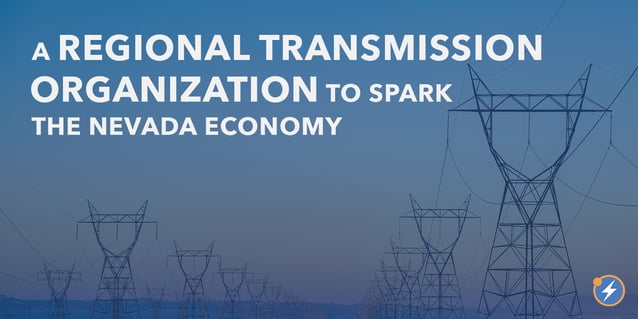
Right now, Nevada’s electric grid operates more or less as an island, and the households and businesses that rely on that island are increasingly at risk of being stranded. Except under limited circumstances, the state’s utilities must produce enough of their own electricity to meet their customers’ needs, then transport that energy using their own poles and wires. This situation not only requires Nevadans to pay for more electricity infrastructure than they should, but also leaves them particularly vulnerable to extreme weather events.
Thankfully, there is a solution that would not only make Nevada’s grid of the future more reliable, but also help attract more business and economic development to the state. If Nevada leads the way in working with other western states to form what’s called a Regional Transmission Organization (RTO), it would improve the reliability of the electric grid that powers Nevadans’ homes and businesses, save residents money, and give the state a competitive advantage in attracting more job creators to the state. An RTO, which is at its essence, a region-wide competitive market for energy, would allow Nevada to tap into wind power or hydropower from other states in the region when the sun isn’t shining. Conversely, it would allow Nevada to send its extra solar and geothermal energy to other states when it’s producing more than the state can consume. The ability to buy and sell low-cost, geographically diverse resources would help keep the lights on through varying weather conditions, ensuring Nevadans are not left stranded and enabling the state’s business and economic backbone to continue to move, grow, and diversify. The financial benefits of this are also significant – a state-led market study estimated that an RTO would save Nevada households and businesses up to $45 million annually.
Low energy costs and reliability are critical to attracting and retaining businesses that bring diversified economic activity and more non-energy jobs to the state. And for a state like Nevada, which boasts 24/7 entertainment, an impressive tourism economy, and a hospitable economic climate for cutting-edge employers and data centers, the electricity is the economy. Furthermore, RTOs give companies more options to meet their sustainability goals. Nearly half of the largest publicly traded companies in the United States have clean energy commitments, and that number is only growing. These businesses often prefer to site in states that offer access to an RTO, because it facilitates their procurement of clean, affordable, and reliable energy.
The operational flexibility that an RTO provides, and its greater ability to integrate more renewable resources, means that more resources can be built in the state. That creates good, new energy economy jobs developing generation facilities and the transmission lines that will carry energy across the West. Nevada’s advanced energy economy already employs over 31,000 people, with 7% expected growth before taking into account the job benefits that an RTO will stimulate.
In 2021, the Nevada legislature passed, with bipartisan support, the New Energy Economy Act (Senate Bill 448) sponsored by Senator Chris Brooks and signed by Governor Sisolak. The bill requires electric utilities to join a Western RTO by 2030. Of course, a west-wide RTO does not yet exist, but there’s no reason that Nevada should wait for long to dig into the hard work of designing an RTO created by and for the western states. At the first interim session hearing of the Nevada Legislature’s Committee on Growth and Infrastructure on January 12, 2022, AEE will be presenting on the economic benefits of joining an RTO, and is calling on state leaders to keep up the momentum and conversation so that the state can reap these benefits sooner, rather than later. Nevada is at the cutting edge of building the grid of the future, and we look forward to working with the newly appointed members of Governor Sisolak’s Regional Transmission Coordination Task Force as it continues to lead the way.